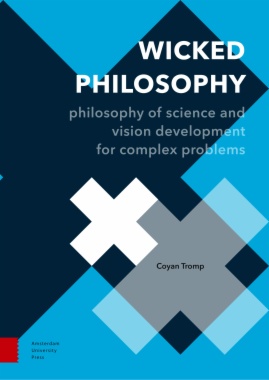Wicked Philosophy. Philosophy of Science and Vision Development for Complex Problems provides an overview of the philosophy of the natural sciences, the social sciences and the humanities, and explores how insights from these three domains can be integrated to help find solutions for the complex, ‘wicked’ problems we are currently facing.
The core of a new science-based vision is complexity thinking, offering a meta-position for navigating alternative paradigms and making informed choices of resources for projects involving complex problems. The book also brings design thinking into problem-solving and teaching, fostering construction of an integrative approach that bridges structure and action amplified by transdisciplinary engagement of stakeholders in society.
It is not always easy to set up a succesfull philosophy course for students in other programs. The author of
Wicked Philosophy, Coyan Tromp, has experience in designing courses on philosophy of science for various Bachelor programs.
You can find two examples here.The first example is for an introductory course to an Interdisciplinary Philosophy of Science, which is specifically suited for programs focusing at complex problems such as sustainability or health issues.
The second example is a program for a course on (Philosophy of) Science in a Post-Truth Society.
More examples are also available (e.g. a program in which Philosophy of Science is combined with Vision Development and Future Scenarios).
In addition to the program, the author can also provide a workbook with lesson plans, both for online and on campus settings as well as additional literature suggestions for Dutch and French programmes.
Please contact us at marketing@aup.nl for questions or extra material.
- Contents
- Preface
- 1. Twenty-First-Century Science
- 1.1 ‘Wicked’ Problems: The Great Challenges of Our Times
- 1.2 The State of Modern Science
- 1.2.1 Foundations of Modern Science
- 1.2.2 First Foundation: Valid, Logical Inference
- 1.2.3 Second Foundation: Empirical Observation
- 1.2.4 The Ideal of Unified Science
- 1.2.5 Dissent against the Orthodox Consensus
- 1.3 The Inevitability of Philosophy
- 1.3.1 The Münchhausen Trilemma
- 1.3.2 Paradigm Shifts: Tipping Points or Turning Points?
- 1.3.3 Turns in Philosophy of Science
- 1.4 Future Avenues
- 1.4.1 The Need for an Integrative Approach
- 1.4.2 Complexity Thinking: A New Paradigm in Science?
- 2. Contemporary Approaches
- 2.1 The Traditional Standard Research Model
- 2.1.1 The Empirical Cycle
- 2.1.2 The Deductive-Nomological Explanatory Model
- 2.1.3 Critical Rationalism Critically Assessed
- 2.2 Interpretivism as an Alternative Paradigm
- 2.2.1 The Hermeneutic Circle
- 2.2.2 Construction and Deconstruction
- 2.2.3 The Double Interpretation Challenge
- 2.2.4 One-Sided Interpretation versus Reciprocal Adequacy
- 2.3 Current Models and Future Thinking
- 2.3.1 The Model Cycle
- 2.3.2 Simulation as a Way to Enhance Systems and Design Thinking
- 2.3.3 �Computation and Design: New Imperialism or Emancipation of the Sciences?
- 2.4 Unity in Diversity
- 3. Structure and Action in Science
- 3.1 Objective Structures or Subjective Perspectives?
- 3.1.1 Correspondence and Representation
- 3.1.2 Perspectivism and Fallibilism
- 3.1.3 An Instrumental Outlook on Science
- 3.2 A Clash of Approaches?
- 3.2.1 There Is No Mastermind
- 3.2.2 From Mastermind to Mapmaking
- 3.2.3 Coherence and the Explanatory Power of Narratives
- 3.2.4 Towards a Network Model of Correspondence and Coherence
- 3.3 Beyond the Oppositions
- 3.3.1 The Duality of Structure
- 3.3.2 The Stratification of Reality: From Naive to Critical Realism
- 3.3.3 A New Perspective: Knowledge as a Coral Reef
- 3.4 Towards a More Dynamic View of Science
- 3.4.1 The Action Cycle
- 3.4.2 Design Thinking and the Policy Cycle
- 4. Science as a Rational Process
- 4.1 The ‘Project of Reason’
- 4.2 Unintended and Unwanted Consequences of the Rationality Process
- 4.2.1 Reduced and Reducing Rationality
- 4.2.2 Fragmentation and Alienation
- 4.3 The Societal Value of Science
- 4.3.1 Science as a Quasi-Neutral Solution Factory
- 4.3.2 Mode 1 and Mode 2 Knowledge
- 4.3.3 (How) Does Science Find its Way into Society?
- 4.4 Does Knowledge Also Imply Wisdom?
- 4.4.1 Towards a More Sensible Continuation of the Rationalisation Process
- 4.4.2 Slow Questions
- 4.5 From Funnel Rationality to a More Comprehensive Rationality
- 5. Robust Knowledge for Complex Problems
- 5.1 Towards a Complexity-Based, Integrated Research Approach
- 5.1.1 Methodological Implications of Complexity Thinking
- 5.1.2 Engaging in Complexity
- 5.1.3 Varying Regimes of Justification
- 5.2 Science in Progress
- 5.2.1 How to Determine the Reliability of Knowledge
- 5.2.2 Are Different Paradigms incommensurable?
- 5.2.3 Progressive Research Programmes and Problem Agendas
- 5.3 Quality Criteria for Research into Complex Issues
- 5.3.1 Objectivity Defined as Critical Intersubjectivity
- 5.3.2 Science and Accountability
- 5.3.3 Searching for Common Ground within Regimes of Justification
- 5.4 Dealing with Complexity
- 6. The Future of Science
- 6.1 Science and Futures Thinking
- 6.1.1 Combining Know-What with Know-How
- 6.1.2 How to Solve the Knowledge Paradox
- 6.2 Vision-Based Science and Science-Based Visions
- 6.2.1 Vision with or without a Capital ‘V’?
- 6.2.2 Virtual Realities and Possible Futures
- 6.2.3 Visions as Forecasting Paradigm Changes
- 6.2.4 Transformative Learning as New Educational Vision?
- 6.3 From Funnel Vision to Comprehensive Science
- 6.3.1 From Simple towards Reflexive Modernisation
- 6.3.2 Towards a Super Rationality, or How to Live a Wise Life
- References
- Glossary and Index
- Colophon

